SUMMARY
This is AI generated summarization, which may have errors. For context, always refer to the full article.
![[ANALYSIS] Hype around China is out. Vanilla diplomacy is in.](https://www.rappler.com/tachyon/2023/06/marcos-year-1-diplomacy-balancing-act-june-19-2023.jpg)
Almost a year into Ferdinand Marcos Jr.’s presidency, the People’s Liberation Army (PLA) Navy’s largest and most modern training ship dropped anchor in Manila’s waters for a goodwill visit. The 163-meter long Qi Jiguang is bigger than any Philippine navy warship or coast guard patrol vessel. Manila was its final stop, having come from other countries in Southeast Asia: Vietnam, Brunei, and Thailand.
It was China’s first port call under President Marcos. What was noticeable amid the fanfare of lion dancers, a brass band, and Chinese-Filipinos waving the flags of both countries, was the absence of a high-level Philippine official to welcome it.
Let’s rewind to 2019, the last time Chinese vessels – a naval escort fleet of two missile frigates and a supply ship – visited the Philippines. Then-defense secretary Delfin Lorenzana and navy chief Vice Admiral Robert Empedrad toured one of the missile frigates in what was a high-profile event.
Before that, in May 2017, then-president Rodrigo Duterte, accompanied by Lorenzana, inspected three Chinese warships that docked in Davao. Duterte said he asked to visit the guided missile destroyer, the guided missile frigate, and the replenishment ship, which were part of “confidence-building and goodwill…to show that we are friends.”
Today, the sea winds are blowing differently. Hype surrounding China is out; vanilla diplomacy with the giant neighbor is in.
Out of China’s embrace
Marcos has gotten out of his predecessor’s tight six-year embrace of China, fortifying the country’s alliance with the United States, Japan, and Australia and building relations with Europe. In his overseas trips, from Phnom Penh to Brussels to Washington DC, he indirectly addressed the Philippines’ maritime row with China by speaking consistently on this theme: follow international law and the United Nations Convention on the Law of the Sea (UNCLOS). During the first ASEAN-EU summit, he asked the European nations to help the Philippines and other countries in Southeast Asia enforce UNCLOS.
While a signatory to UNCLOS, China has rejected an international arbitral ruling declaring its expansive nine-dash-line claim to South China Sea illegal.
Security relations with the US surged to a new momentum as the Marcos administration approved US military access to four additional sites (total of nine) under the Enhanced Defense Cooperation Agreement (EDCA), which was forged in 2014, and hosted the largest ever joint military exercises with the US.
Selective disclosure of Chinese aggression in the West Philippine Sea, the norm during the Duterte regime, has changed to full transparency. The Philippine Coast Guard, which is on the frontlines of patrolling the WPS, has been tasked to inform the public on Chinese incursions, supported by photographs and videos. For the first time, the coast guard has included journalists in their air and sea patrols of the WPS.
Ukraine and Marcos
Apparently, Ukraine has had a tremendous effect on the thinking of Marcos. During his inauguration on June 30, 2022, the President mentioned Ukraine, not South China Sea, in his speech. He said: “We face prospects of the spread of the war abroad, of which we are totally blameless. We seek friendship with all. But countries like ours will bear the brunt of it. And if the great powers draw the wrong lessons from the ongoing tragedy in Ukraine, the same dark prospect of conflict will spread to our part of the world.”
While he did not elaborate, this was a veiled reference to China and the possibility of this power invading Taiwan. This would mean the Philippines will be affected – and may get involved – simply because of its geography. There is a fear that the Philippines may be drawn into a war not of its own making.
Russia’s invasion of Ukraine and its implications on Taiwan appears to be one of the factors that drove Marcos’s shift to the US. One part of the Balikatan exercises took place in Batanes, the northernmost province of the Philippines which is near Taiwan. Three of the four new EDCA sites are located in the northern part of the country, facing Taiwan.
Smart diplomacy and India
As Marcos finds himself in this new geopolitical environment fraught with danger, he wants to lower the temperature by delicately balancing between China and the US. Expectedly, he has warm words to say of the rival superpowers. During his visit to New York in September 2022, he said that he could not see the future of the Philippines without the US as partner.
Recently, during a speech at an event of the Association of Philippines-China Understanding, which has close links to the Chinese embassy, Marcos said that bilateral ties had been a “boon to our country’s economic strength over the past years.”
Beyond balancing relations with the superpowers, Marcos needs to be smarter in engaging with China. He can cultivate deep security relations with India, a counterweight to Asia’s behemoth. India is the world’s fifth biggest economy and has overtaken China as the world’s most populous country.
So far, bilateral security ties are relatively young. The Philippines and India have set up a Joint Defense Coordination Committee, the fourth meeting of which was held last April in New Delhi. The two sides discussed ways to enhance maritime security cooperation and renewed their commitment to uphold UNCLOS.
The armed forces of both sides have their own bilateral mechanism, the Service-to Service meeting. So far, only two meetings have been held.
In 2022, the most significant development happened in the two countries’ security ties when the Philippines bought from India a shore-based anti-ship missile system, the first country to do so. The supersonic cruise missile, manufactured by BrahMos Aerospace, will be used for the Philippines’ territorial defense. The delivery of the first batch is expected by the end of 2023.
Marcos cannot let the opportunity to grow the country’s maritime and security relations with India pass. His tightrope act can only go so far. – Rappler.com
1 comment
How does this make you feel?


![[EDITORIAL] Diplomasya ni Rodrigo Duterte sa Tsina: Nakaluhod nang dikit ang noo sa lupa](https://www.rappler.com/tachyon/2024/05/animated-duterte-china-panatag-shoal-carousel.jpg?resize=257%2C257&crop_strategy=attention)
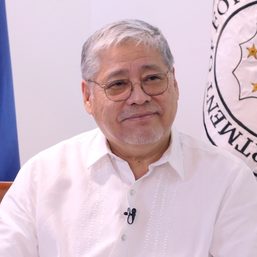
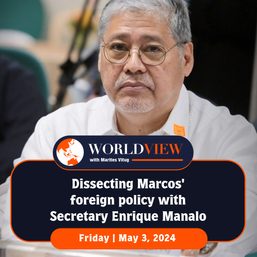

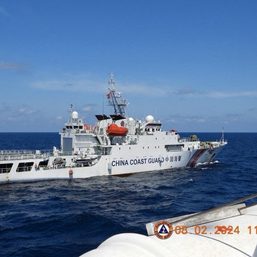



![[ANALYSIS] High noon for Marcos](https://www.rappler.com/tachyon/2024/06/high-noon-for-marcos.jpg?resize=257%2C257&crop_strategy=attention)



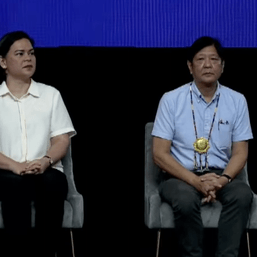

![[OPINION] Expectations for Philippines-US-Japan trilateral cooperation: A view from Japan](https://www.rappler.com/tachyon/2024/04/tl-ph-usa-jp-cooperation.jpg?resize=257%2C257&crop=447px%2C0px%2C1080px%2C1080px)
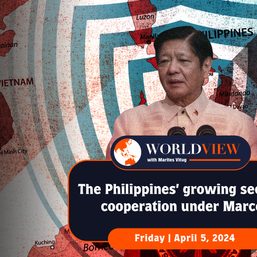
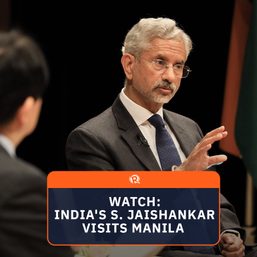


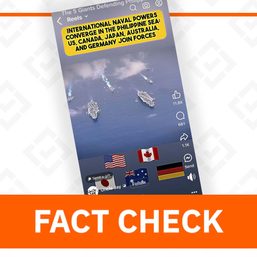
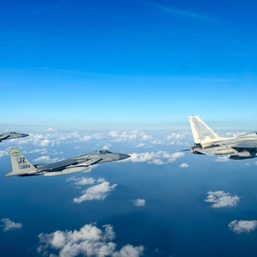



![[Rappler Investigates] When China, Leila, Sara conspire](https://www.rappler.com/tachyon/2024/06/saraduterte-west-ph-sea-leila-de-lima-newsletter-june-27-2024.jpg?resize=257%2C257&crop=279px%2C0px%2C720px%2C720px)


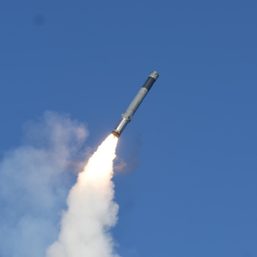

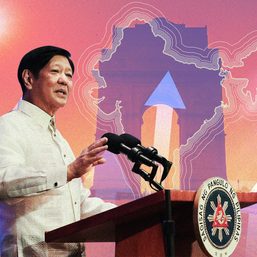









Indeed, “Marcos cannot let the opportunity to grow the country’s maritime and security relations with India pass.” But it seems that PBBM has given and will always give greater priority to Maharlika Investment Fund (as his Vehicle of Corruption?), the Agriculture Sector (for agricultural products smuggling?), his favorite Sound of Silence (his family’s Estate Tax nonpayment), his favorite pastime – more travels abroad and his most valuable secret motive (how to stay in power forever).